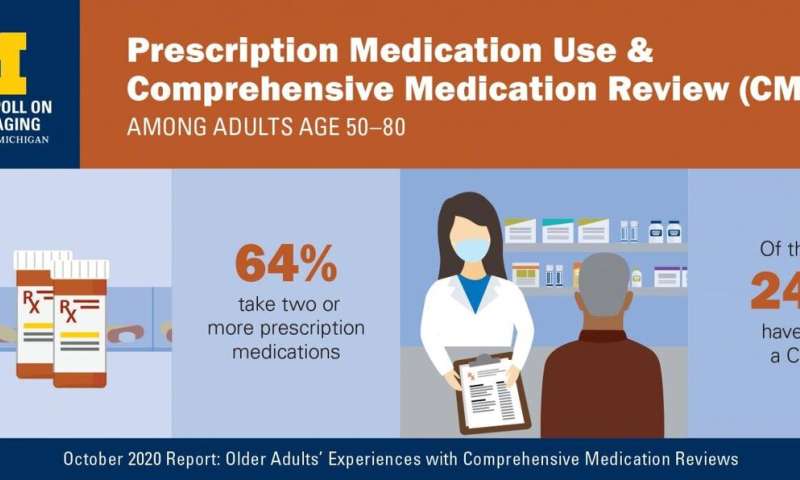Clashing medications put older adults at risk but many haven’t had a pharmacist check them


Two-thirds of older adults rely on at least two prescription drugs, and more than half take two or more non-prescription drugs or supplements. And two in ten take five or more prescription drugs. Some of those pills, capsules and tablets may interact with one another in ways that could put them at risk.
But a new poll shows that most people over 50 haven’t connected with a pharmacist to check for potential clashes among their prescription drugs, non-prescription drugs, and supplements, or the potential to save money by switching to lower-cost options.
Medicare Part D plans offer free in-depth medication reviews for enrollees who meet their eligibility criteria. However, participation has historically been low. The new poll shows 85% of Medicare Part D enrollees who had not had a medication review didn’t know they could be eligible for one. Some non-Medicare plans also cover reviews, but 86% of all older adults without a medication review said they weren’t aware that it could be covered.
The new findings come from the National Poll on Healthy Aging, based at the University of Michigan’s Institute for Healthcare Policy and Innovation with support from AARP and Michigan Medicine, U-M’s academic medical center. The new report draws on responses from a national sample of more than 2,000 adults aged 50 to 80.
The poll team worked with two faculty in the U-M College of Pharmacy who have studied the issue of multiple medication use, and the policies and practices aimed at improving use and reducing the risky side effects they can cause.
“These results show the importance of continuing efforts by physicians, pharmacists, other health care providers, insurers and policymakers to help older adults understand the importance of medication reviews,” says Antoinette B. Coe, Pharm.D., Ph.D., an assistant professor of clinical pharmacy.
“Since older adults with multiple chronic illnesses and medications, high medication costs and Part D Medicare coverage may qualify for a covered medication review, and their health plans are graded publicly on how many qualified participants receive a review, our finding that so many are unaware of the option is surprising,” says Karen B. Farris, Ph.D., M.P.A., a professor of clinical pharmacy.
Coe and Farris do note that the older adults at the highest risk of drug interactions—those taking five or more prescription medications—were more likely to have had a comprehensive medication review than those taking fewer medications, though there is still room for improvement.
The poll shows an opportunity for progress. When the poll team asked older adults who take multiple prescription medications if they’d be interested in going over them with a pharmacist, more than a third said yes.
The older a poll respondent was, the more likely she or he was to take multiple prescription and over-the-counter medications. In all, 30% of those over 65 took five or more prescription medications, compared with 19% of those aged 50 to 64. And 15% of those over 65 said they take five or more over-the-counter medications, vitamins and supplements, compared with 9% of those in their 50s and early 60s.
Preeti Malani, M.D., the poll director and a Michigan Medicine physician specializing in geriatrics and infectious diseases, notes that every older adult should keep a list of everything they take, whether they get it via a prescription or buy it directly. A providers or pharmacist can look at the list to try to spot any potential for interactions or opportunities to switch to lower-cost options that could provide the same benefits.
“It’s also important to make sure you tell your doctors and other health care providers about everything you take, even over-the-counter vitamins or herbal remedies,” she says. “Not only may they spot potential risks, but the computer systems that they use to track your care might identify potential interactions.” She also notes that medication reviews can take place in person, by phone or via a video appointment.
“Managing multiple medications may be especially important for older adults,” says Alison Bryant, Ph.D., senior vice president of research for AARP. “We know that people enrolled in Medicare Part D take an average of 4.5 medications each month. We encourage everyone taking medications or supplements to regularly discuss them with a health care provider.”
Source: Read Full Article